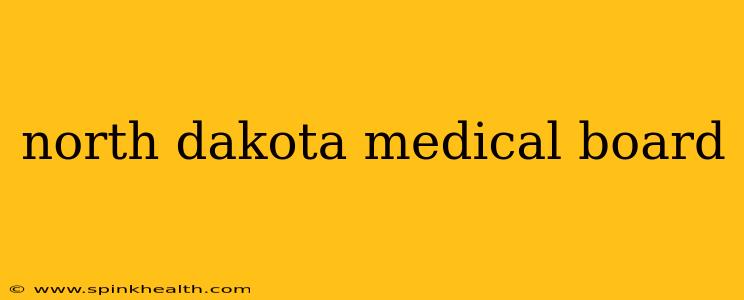The North Dakota Medical Board plays a crucial role in ensuring the safety and well-being of the state's citizens by regulating the practice of medicine. Understanding its functions, processes, and the answers to common questions is vital for both medical professionals and the public. This comprehensive guide delves into the heart of the North Dakota Medical Board, offering insights and clarity on its operations.
Imagine this: you're a physician navigating the complexities of licensing, or perhaps a concerned patient needing to file a complaint. Knowing where to turn and how to proceed can be the difference between smooth sailing and a frustrating experience. This guide acts as your compass, steering you through the intricacies of the North Dakota Medical Board.
What is the North Dakota Medical Board?
The North Dakota Medical Board is the state agency responsible for licensing, regulating, and disciplining physicians and other healthcare professionals within the state. Its primary mission is to protect the public's health and safety by ensuring that medical practitioners meet stringent standards of competence, ethics, and professional conduct. They accomplish this through a rigorous licensing process, ongoing monitoring, and a system for handling complaints and disciplinary actions. Think of them as the guardians of medical practice in North Dakota, ensuring quality care for all.
How do I become a licensed physician in North Dakota?
This is a journey that requires careful planning and adherence to the board's specific requirements. The process generally involves submitting a comprehensive application, providing verification of medical education and training, passing required examinations, and undergoing a background check. The North Dakota Medical Board's website provides detailed information on the application process, including necessary forms, fees, and timelines. It's crucial to meticulously follow all instructions to avoid delays.
What are the requirements for medical licensure in North Dakota?
The North Dakota Medical Board mandates specific qualifications for licensure, emphasizing both academic achievements and professional ethics. These requirements generally include:
- Graduation from an accredited medical school: The school must be recognized by the relevant accrediting body.
- Successful completion of medical residency or equivalent training: The type and length of residency will vary depending on the specialty.
- Passing scores on USMLE (United States Medical Licensing Examination) or COMLEX (Comprehensive Osteopathic Medical Licensing Examination): These examinations assess competency in medical knowledge and skills.
- Background check and fingerprinting: This ensures the applicant's suitability for practicing medicine in the state.
- Verification of medical training and experience: This step verifies the authenticity of claimed credentials.
How do I file a complaint against a physician in North Dakota?
If you have concerns about the conduct or competence of a physician, the North Dakota Medical Board provides a formal process for filing complaints. It's crucial to provide detailed and accurate information to support your claim. The board will investigate the complaint and take appropriate action based on its findings. The process is designed to be fair and impartial, ensuring that all parties involved have the opportunity to be heard.
What types of complaints does the North Dakota Medical Board investigate?
The board investigates a range of complaints relating to physician conduct and competence, including:
- Medical malpractice: This involves negligence or misconduct leading to patient harm.
- Substance abuse: The board takes a strong stance against impaired physicians.
- Professional misconduct: This includes unethical behavior, such as boundary violations or fraudulent billing practices.
- Incompetence: This relates to a physician's lack of skill or knowledge to perform their duties safely.
How can I verify a physician's license in North Dakota?
Verifying a physician's license is a simple process. The North Dakota Medical Board's website typically provides a searchable database where you can check the license status of any physician practicing in the state. This database allows you to confirm whether a physician is licensed, the status of their license (active, inactive, suspended, etc.), and any disciplinary actions taken against them.
What are the consequences of violating the North Dakota Medical Board's rules?
Violating the board's rules can result in a range of disciplinary actions, depending on the severity of the violation. These actions can range from a formal reprimand to license suspension or revocation. In serious cases, criminal charges may also be filed. The board’s aim is not just to punish but to prevent future harm to patients and maintain the integrity of the medical profession in North Dakota.
This guide provides a general overview. For the most up-to-date and precise information, always refer to the official North Dakota Medical Board website. Their website is your ultimate resource for detailed information and access to all the necessary forms and procedures. Remember, navigating this system effectively protects both the medical professionals and the public they serve.

